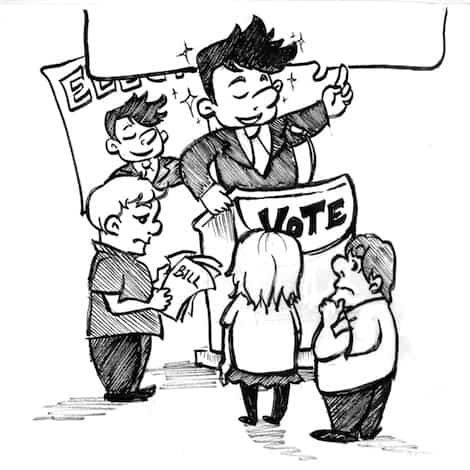With the 2014 University of Toronto Students’ Union (UTSU) election campaign well underway, it is encouraging to see two full executive slates and one independent contesting the election. It is troubling, however, that none of the candidates have substantively addressed many of the most important issues affecting U of T students; rather, most have offered vague goals without viable plans for how to achieve them. At tonight’s executive forum and for the rest of the campaign, The Varsity calls on all candidates to provide substantive answers to the important questions that the new leaders of U of T’s largest student union must face.

ANN SHENG/THE VARSITY
Most obviously, the candidates must address the ongoing controversy surrounding defederation and the Student Societies Summit. The complaints and grievances of some union members, expressed last year when three divisions voted to leave the union, will not go away. After seven months of summit meetings, the union membership appears even more divided than at the beginning of the year. Now, most divisional societies support in principle the right of division to leave the union. Anyone who wants to lead the UTSU must address the urgent danger of losing thousands of members.
Unite deserves some credit for, at least, articulating a position on the subject — they oppose defederation but would allow it. Yet, this is far from a comprehensive policy. How will they try to conciliate disillusioned members and, more importantly, how would they compensate for the loss if divisions do leave? On the other hand, that U of T Voice has not addressed this controversy demonstrates a willful blindness to the political climate on campus. If they oppose defederation, what will they do to heal deep division within the union? Existing methods and rhetoric have obviously failed.
In contrast, almost all candidates have something to say on the subject of university funding, tuition, and fees. Many candidates have laudable goals, but these are often vague and few have presented concrete plans to achieve them. The university already faces a significant deficit, and has accrued more than five hundred million dollars in deferred maintenance due to underfunding. U of T Voice says it will fight to lower tuition and eliminate fees. Where do they suggest that the university find the money to balance its budget? Team Unite says it will work with the administration to develop a budget that prioritizes students. What specific budgetary changes will they recommend and what does “prioritize students” mean in practice?
All candidates should also address the details of provincial education funding. Ontario is considering a differentiated funding formula, and there are strong arguments for the outcome-based formula implemented in Tennessee. Candidates must tell voters whether they think the province should provide more funding, where that funding should come from, and how it should be distributed.
Closer to home, U of T’s campus life often leaves much to be desired. Both UTM and UTSG face an increasingly urgent shortage of student housing. The UTSU has opposed the Knightstone housing development proposals over safety and accountability concerns, while the city has blocked the Waverly development. Meanwhile, U of T is proceeding with another development proposal on Spadina Avenue. Do our candidates agree that we face a housing crisis, and what solutions or changes would they advocate to fix the problem?
More broadly, generations of students have complained that U of T lacks an overarching sense of campus community, and that many students are disengaged from campus life. Some argue that U of T’s many divisions, colleges, campuses, and clubs make it a community of communities, and that this works well for an institution of our size. Others contend that more should be done to foster and strengthen U of T’s school spirit and student engagement, with a view to building a campus-wide community. Candidates who agree with the former perspective should explain how they would adapt union services and structure to this reality. Those who take the latter view must provide specifics on how they will create a more cohesive student body and engage more students with the union.
These are only a few of the many challenges that our new union leaders will have to face. Too often, debate about the union’s future, education funding, campus life, and a host of other issues is reduced to platitudes and bullet points. UTSU election candidates are lucky to have a well-educated electorate, who deserve substantive platforms.
At the same time, we must not allow the discourse to degenerate into the petty personal and procedural disputes that often distract from the real issues in student election campaigns. All U of T students are asked to pay more in tuition and fees every year, while the university slides into deficit. Many struggle to find a safe and affordable home. Still more feel alienated from our university and lack a community where they feel welcome.
These problems are complex, and they require complex solutions. Those who want to lead our student body should have solutions to propose, and be ready to convince students that those solutions are worth voting for.

